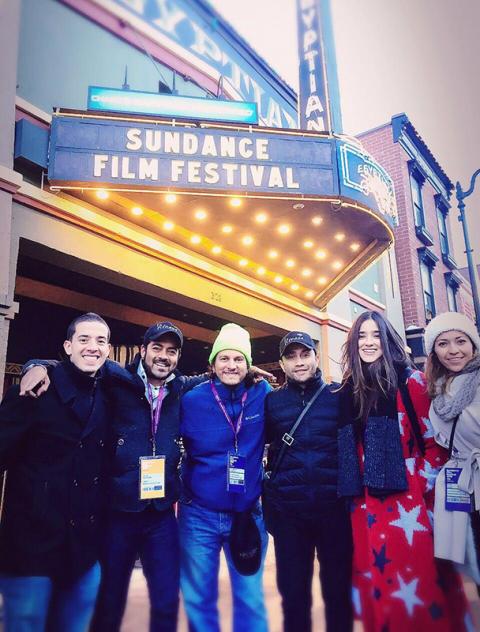Student Scores Sundance Award-Winning Film

David Murillo R. at Berklee’s Shames Family Scoring Stage
Mike Keefe-Feldman

Murillo (left) stands at the Sundance Film Festival's Egyptian Theater with colleagues including "Between Sea and Land" writer/creator/actor Manolo Cruz (third from right) and actress Viviana Serna (second from right). Murillo composed the score to the film, which is up for an award in the festival's World Dramatic category.
Courtesy David Murillo R.

"Everything about this project was a miracle," says Murillo, who joined filmmakers for the world premiere of "Between Sea and Land" at Sundance on Friday, January 22.
Courtesy David Murillo R.

A still shot from Manolo Cruz’s "Between Sea and Land"
Courtesy of Global Screen

Murillo meets actor Danny Glover at the Sundance Film Festival.
Courtesy David Murillo R.

Murillo is pursuing a dual major in film scoring and electronic production and design at Berklee and has scored numerous short films and features during his time as a student.
Mike Keefe-Feldman

Murillo aims to secure in internship in Los Angeles after graduation and, ultimately, a visa that will enable him to continue his scoring work in Hollywood.
Mike Keefe-Feldman
On Friday, January 22, David Murillo R., a Berklee student from Medellín, Colombia with a dual major in film scoring and electronic production and design, boarded a plane in Boston and, that night, joined a packed house at the Sundance Film Festival in Utah for the world premiere screening of La Ciénaga: Entre el Mar y la Tierra (or Between Sea and Land). The film from Colombian writer, creator, and actor Manolo Cruz presents a universally resonant story of maternal and filial love with a dramatic heft that will surely challenge even the most hardened viewers to keep from welling up with emotion.
Sundance audiences loved the movie, as evidenced by its winning the festival's Audience Award for Best Film and the Special Jury Award for Acting, both in the World Cinema Dramatic category.
Murillo scored the film, having previously worked as a composer on more than a dozen shorts, including Nefertiti’s Daughters, a film about street artists at the forefront of the struggle for freedom and women’s rights in Egypt, which has won multiple international film competitions. Despite this remarkable depth of experience for a 21-year-old composer, Murillo’s wildest expectations for his work on Between Sea and Land (which has recently been picked up for international distribution by Global Screen) didn’t include a trip to Sundance at this early juncture in his career, let alone the international acclaim swelling around the film in the wake of its Sundance debut.
Pointing to what he and his filmmaker colleagues were able to accomplish on a shoestring budget, Murillo says, “Everything about this project was a miracle.”
Watch a preview for the film:
From Medellín to Massachusetts
The new film is not Murillo’s first experience with overcoming budgetary hurdles. Classically trained from a young age, Murillo is a multi-instrumentalist who had performed as a percussionist with orchestras such as the Medellín Philharmonic and the Castile and León Symphony Orchestra. He auditioned for Berklee on marimba, but would not have been able to attend the college's Boston campus were it not for a full scholarship.
Since coming to Berklee, the industrious Murillo has been involved in organizing the college’s Film Scoring Network, now serving as vice president of the student organization that functions as a peer resource to those interested in scoring. Murillo, who plans to graduate this year, is far from the only Berklee student who is actively scoring major projects while still a student. (Fellow student Davey Thomas Tucker, for example, recently completed scoring work for a major portion of the forthcoming A&E/Lifetime romantic web series Fall Into Me.)
Murillo is ebullient about the cooperative spirit among Berklee’s student community that he has contributed to and benefited from over the past several years.
“Everyone is so happy to help each other,” he says. “It’s not like we’re competing against one another. It’s more like we all grow together because we know that we’ll hopefully be working together someday.”
Making a Miracle
The collaborative spirit that Murillo has harnessed at Berklee was also crucial to his scoring work on Between Sea and Land. Handed a locked cut of the film and only 20 days to produce the music, Murillo knew he faced a considerable challenge. In addition, the film's creator, Cruz, wanted to use all live instruments—a choice to buck the electronic trend that is likely heartening to hear for musicians, but which also amounted to another hurdle for Murillo. He enlisted help from friends at Sinfónica EAFIT, the orchestra of Universidad EAFIT in Medellín, to get the job done, recording a 60-piece orchestra for the film.
Murillo’s orchestral score, which draws heavily on strings while introducing subtle but effective elements such as a marimba melody, is used sparingly in the early portion of the film and then becomes increasingly prominent as the story nears its incredibly touching conclusion. While the score stands soundly on its own as a well-crafted composition, Murillo says that one of the most important lessons he has learned at Berklee is the idea that a score’s role is not to impress others with the composer’s skill.
“Your score is not going to be your masterpiece,” he says. “It’s just a complement to a story, and you can never let your ego or your musical pride get in the way of that.”
Hollywood on the Horizon
For Murillo, pairing music to a visual medium is deeply ingrained in his personality.
“I’ve always loved trying to link my music to a story, especially a story that I can relate to or that people around me can relate to,” Murillo says. “That’s just the way I was configured, and it comes back to the fact that I love movies.”
After graduation, Murillo, who has also taken courses in video game scoring at Berklee, hopes that his work to date will help him secure an internship in Los Angeles and, ultimately, a visa to enable him to work on more films in Hollywood. Given his compositional abilities, his knack for recruiting musicians, and his versatility with tools of the trade like Logic, Digital Performer, and Pro Tools, he has taken the steps necessary to give himself the best chance of making that happen.
In the meantime, Murillo, who will deliver a presentation titled Producing a Feature Film Score at Berklee’s Media Lab on Thursday, March 31, from 6:00 p.m.-8:00 p.m., is eager to share what he has learned so far.
